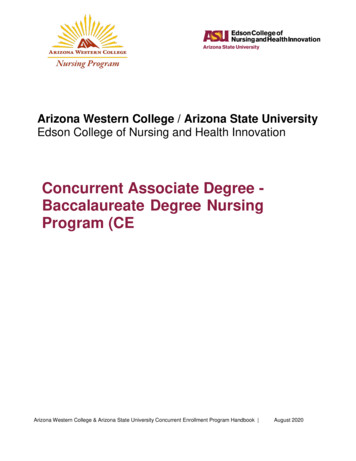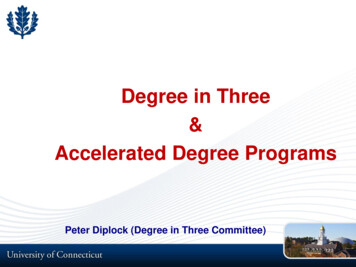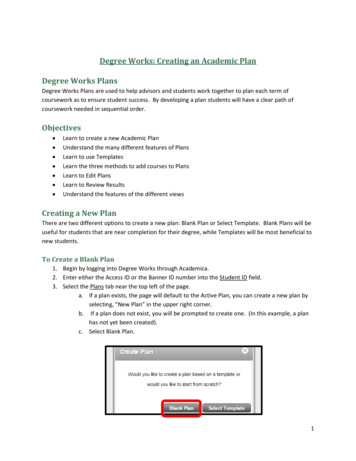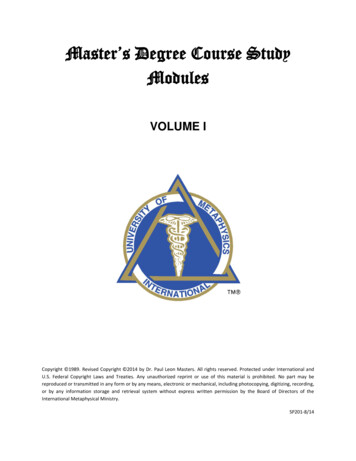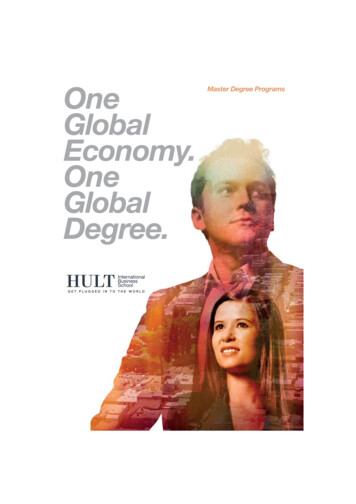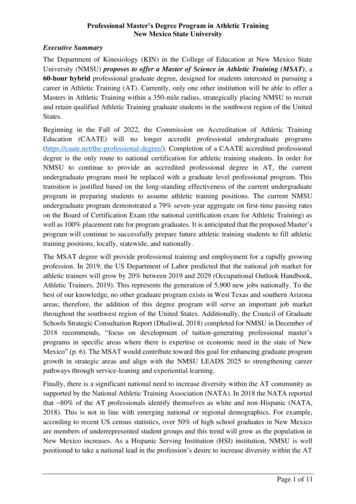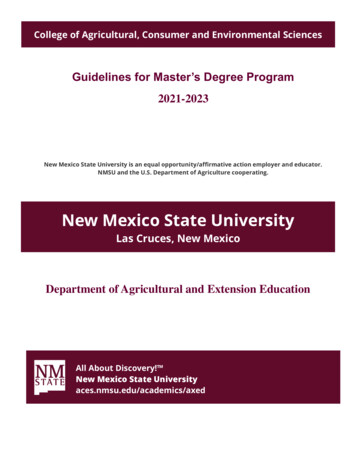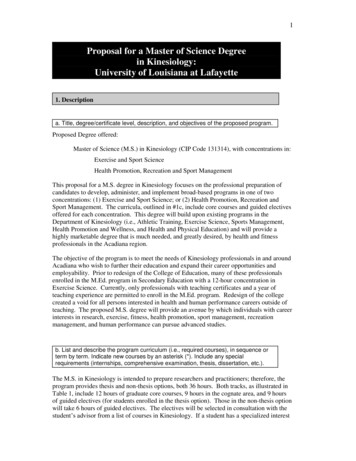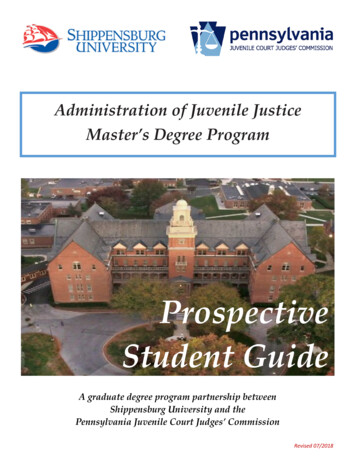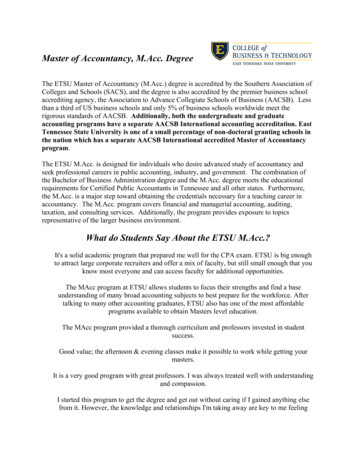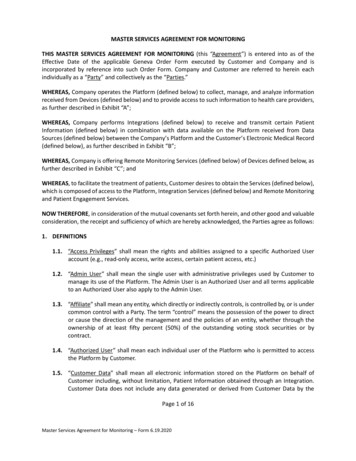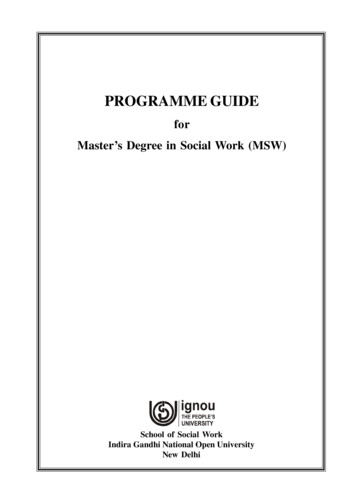
Transcription
PROGRAMME GUIDEforMaster’s Degree in Social Work (MSW)School of Social WorkIndira Gandhi National Open UniversityNew Delhi
Printed material is our backbone. Our study material is prepared by teams of experts keepingin view the interest of the learner group. Each Course has a Course Development Committeeheaded by the Vice-Chancellor and other distinguished academics and professionals involved inthe course preparation. The course material is written in such a manner that the students canstudy it by themselves with a little assistance from our Counsellors at the Study Centres.Further, text books and reference books are available in the libraries attached to the StudyCentres and Regional Centres. Therefore, students will have no need for any cheap or condensedguides for following courses of IGNOU. In fact these may harm them. Hence, the Universitystrongly advise the students not to take recourse to such type of guides.Please keep this Programme Guide safely till you complete theProgramme. You will need to consult it throughout the duration ofthe Programme.IMPORTANT INFORMATION“The University sends study materials and assignments, wherever prescribed, to the students byregistered post and if a student does not receive the same for any reason whatsoever, the Universityshall not be held responsible for that.”.“In case a student wants to have assignments, he/she can obtain a copy of the same from theStudy Centre or Regional Centre or may download it from the IGNOU website - www.ignou.ac.in”“The students are specifically instructed to send Examination Forms to concerned Regional Centresonly and to no other place and they are also advised to submit the Registration/Re-registrationForms only at the respective Regional Centres and nowhere else. If any student sends theRegistration/Re-registration Forms, Examination Forms at wrong places and thereby misses thescheduled date and consequently a semester/year, he/she will have no claim on the University forregularization.”“The policy of reservation for the OBCs/SCs & STs under the CEI Act is applicable toall programmes/courses of study at the undergraduate, graduate, postgraduate levels, etc.except courses or programmes at high levels of specialization including at the post-doctorallevel within any branch of study which the Central Government in consultation with theappropriate statutory authority (UGC/BCI/MCI/AICTE/etc.) may specify” (As per clause 3 IIIof the OM No.1-1/2005-UIA/847 dated 20th April 2008).Programme CoordinatorPrint ProductionDr. SaumyaProgramme CoordinatorBlock-15 (H), IGNOUNew Delhi - 110068Mr. Kulwant SinghSection Officer (P)SOSW, IGNOU, New DelhiMay, 2015 Indira Gandhi National Open University, 2015All rights reserved. No part of this work may be reproduced in any form, by mimeograph or any other means,without permission in writing from the Indira Gandhi National Open .University.Further information about the School of Social Work and Indira Gandhi National Open University courses maybe obtained from the University’s Office at Maidan Garhi, New Delhi-110 068.Printed and published on behalf of the Indira Gandhi National Open University, New Delhi, by Director, School ofSocial Work, IGNOU, New Delhi.Laser Typeset by: Rajshree Computers, V-166A, Bhagwati Vihar, (Near Sec-2, Dwarka), Uttam Nagar, N. Delhi-59Pint at:
CONTENTSPage No.1.The University . 52.The School of Social Work. 53.Salient Features of MSW Programme . 64.Programme Structure for MSW . 65.Scheme of Study . 96.Fee Structure and Schedule of Payment . 187.Medium of Instruction . 198.Instructional System . 199.Evaluation . 2210. Other Useful Information . . 2711. Some Useful Addresses .3112. Some Forms for Your Use . . 32
4
1.THE UNIVERSITYIndira Gandhi National Open University (IGNOU) was established in September, 1985 by an Act ofParliament, with a view to democratise education, so that it covers large segments of population,vocations and professions. The primary emphasis is on innovation, flexibility and cost effectiveness.Thus, it is a university with a difference.The major objectives of the university are: to promote the educational well-being of the community, to democratise higher education by providing easy access to all those who desire to improve theirqualifications, skills and competence by taking education to the doorsteps of people living evenin remote and rural areas, to disseminate learning and knowledge through an innovative multi-media teaching-learning system,to provide high quality education at all levels, to coordinate and determine the standards of Distance Education and Open University Systemsthroughout the country.The salient features of this system of education are: study according to your own pace and convenience, study at your own chosen place, flexibility in choosing courses and combination of courses from a wide range of disciplines/subjects, and use of modern and appropriate educational and communication technology.Student support services are provided by the University through a network of study centres scatteredall over the country. Study centres are the actual focal points to enable you to receive regularinformation and learning support. Each study centre provides you with library, audio and video facilitiesto further help you in the learning process. Senior and experienced academics are engaged in faceto-face counseling at study centres. The study centres are generally located ‘in existing educationalinstitutions and normally function on all holidays and Sundays and also in the evenings on workingdays. Each study centre is supervised by a Coordinator. Regional centres have been set up in differentparts of the country to coordinate the functioning of study centres.2. THE SCHOOL OF SOCIAL WORKThe School of Social Work (SOSW) at IGNOU was established in 2007. It aims at providing qualityeducation in the areas of social work, HIV/AIDS, Counselling, and family studies by offeringprogrammes leading to the award of Certificates, Diplomas and Degrees.VisionTo provide inclusive and quality education in social work across the country and beyond the borders.MissionTo provide quality education through open and distance learning using multi-pronged strategiesand services to reach the unreached with an emphasis on social work values and ethics wherebyimproving the services in social welfare sectors.The SOSW at IGNOU is the first School of Social Work to be offering social workprogrammes through ODL system. It is the first School of Social Work in India to take socialwork education to all the States and Union Territories in the country. It has indigenouslydeveloped high quality Self Instructional Materials (SIM) and uses multi-media approach for5
imparting social work teaching and training through its own (IGNOU’s) TV and Radio channelsboth in English and Hindi. It offers social work programmes to in-service candidates and engagesa large number of practitioners for field supervision.Objectives of SOSW To promote human resources aiming at improving the quality of life of poorest of the poor. To meet the growing demand for professionally trained social workers across the country. To provide social work education and training based on indigenous knowledge and uniformcurriculum across the country. To help the learner acquire professional skills and knowledge to help the clients to deal withtheir emotional and psychological problems. To help the learner acquire professional skills and develop capacity in helping people to solvevarious social and economic problems. To help the learner to develop required attitudes in understanding people’s problem solvinginterventions.3.SALIENT FEATURES OF MSW PROGRAMMECompared with MSW offered by other Indian Universities, our programme is unique and innovativein many respects. The salient features of this programme are: 10 2/BPP 3 or its equivalent can also seek admission. Student can study at his/her own pace and convenience over a period of 2 to 5 years. Studentcan study at his/her own chosen pace and not required to attend regular classes. Indigenously prepared self-instructional print materials are provided to students. Print materials are supported with audio and video programmes. Multi-media programme package is made available. Every student of MSW is placed under the supervision of a professionally qualified social workerfor field work supervision. There is a course on history of social work in India titled "Professional social work : Indianperspectives". For the first time a theory paper on "Social Work Practicum" has been introduced as a compulsorypaper.All these aspects are explained in detail in the succeeding sections of this Programme Guide.4.PROGRAMME STRUCTURE FOR MSWThe University follows the credit system for its Master’s Degree Programme. Each credit amountsto 30 hours of study comprising all learning activities. Thus, a 4 credit course involves 120 study hours,a 6 credit course involves 180 study hours and 10 credit course involves 300 study hours. Tosuccessfully complete the MSW programme, you will have to earn 66 credits over a periodof 2 to 5 years depending on your convenience.The Master’s Degree Programme in MSW has three major components:1.Compulsory Papers38 Credits2.Optional Papers8 Credits3.Field Work20 CreditsTotal66 Credits6
4.1 Compulsory PapersThe students have to earn 38 credits in Compulsory papers. The list of compulsory courses is givenbelow.LIST OF COMPULSORY COURSESCourse CodeCourse TitleCreditsCompulsory CoursesMSW-001Origin and Development of Social Work (Theory)4MSW-002Professional Social Work : Indian Perspectives (Theory)4MSW-003Basic Social Science Concepts4MSW-004Social Work and Social Development (Theory)4MSW-005Social Work Practicum and Supervision (Theory)4MSW-006Social Work Research (Theory)6MSW-007Case Work and Counselling : Working with individuals4MSW-008Social Group Work : Working with groups4MSW-009Community Organization Management for CommunityDevelopment44.2 Optional Course in Social WorkUnder the category of optional courses, you have to choose two courses, to earn 8 credits (4 eachper course).LIST OF OPTIONAL COURSES IN SOCIAL WORK DISCIPLINECourse CodeCourse TitleCreditsMSWE-001HIV/AIDS : Stigma, Discrimination and Prevention4MSWE-002Women and Child Development4MSWE-003Disaster Management4MSW-010Introduction to Philanthropic Social Work4MSWP-001Dissertation (Project Work)4Additional optional courses will be offered at a later stage.If you do not get material in time write to:Registrar, MPDD, IGNOU, Maidan Garhi, New Delhi - 110068.4.3Field Work ComponentsThe third component of the MSW programme is the Field Work Practicum. The University hasprepared two Field Work Journals for the 1st and 2nd year separately. Each year you are expectedto successfully complete 10 credits of Field Work Practicum under the guidance of a professionallyqualified Social Worker. The Coordinator at the Study Centre will provide you with an approvedguide who has done MSW/M.A. (Social Work). Only a qualified guide can supervise you for7
your field work; this is mandatory. Therefore ensure from the coordinator at the study centre thatyour supervisor has formal qualification in social work at post graduation level. Completion of FieldWork in MSW Ist year is mandatory for starting social work practicum of second year.List of Field Work ComponentsCourse Code YearTitleCreditsMSWL-0011st yearSocial Work Practicum-I (Practical)10MSWL-0022nd yearSocial Work Practicum-II (Practical)10Year-wise Distribution of CoursesFirst YearCourse1.Origin and Development of Social Work (MSW-001)42.Professional Social Work : Indian Perspectives (MSW-002)43.Basic Social Science Concepts (MSW-003)44.Social Work and Social Development (MSW-004)45.Social Work Practicum and Supervision (MSW-005)46.Social Work Research (MSW-006)67.Social Work Practicum-I (Practicals) (MSWL-001)1036 CreditsIInd Year1.Case Work and Counselling : working with individuals (MSW-007)42.Social group work : working with groups (MSW-008)43.Community Organization Management for Community Development (MSW-009)44.Any two elective courses, from the following:5.i)HIV/AIDS : Stigma Discrimination and Prevention (MSWE-001)4ii)Women and Child Development (MSWE-002)4iii) Disaster Management (MSWE-003)4iv) Introduction to Philanthropic Social Work (MSW-010)4v)Dissertation (Project Work) (MSWP-001)4Social Work Practicum-II (Practicals) (MSWL-002)10(For MSW 2nd year : 30 credits)Total Credits 66In order to enable you to complete MSW Programme within the minimum period of two years, youare allowed to take 36 credits worth of courses in 1st year and 30 credits in 2nd year.8
For electronic version of the prospectuswww.ignou.ac.inFor further information contact any IGNOU Regional Centre or write to:Dr. SaumyaBlock-15 (H), IGNOUMaidan Garhi, New Delhi-110068Email: saumya@ignou.ac.in5.SCHEME OF STUDYYear-wise Scheme of StudyYear otalCreditsIst Year26 Credits10 Credits36Second Year12 Credits8 Credits10 Credits3036 Credits8 Credits20 Credits66TotalAfter the first year, whether you pass/attempt the first year examinations or not, you canseek admission for the second year by submitting the course registration form with requisiteprogramme fee within the re-registration schedule as notified by the university.MSW (1st year) CurriculumMSW-001: ORIGIN AND DEVELOPMENT OF SOCIAL WORKBlock 1History of Social Work: Global ScenarioUnit 1History of Social Work in AmericasUnit 2History of Social Work in EuropeUnit 3History of Social Work in Asia Pacific-IUnit 4History of Social Work in Asia Pacific-IIUnit 5History of Social Work in Africa and Middle EastBlock 2Social Work Profession and EducationUnit 1Social Work as a ProfessionUnit 2Social Work Education: Retrospect and ProspectsUnit 3Social Work Education through Distance LearningUnit 4Values, Principles and Ethics of Professional Social WorkBlock 3Social Work Concepts and Primary MethodsUnit 1Introduction to Social Work ConceptsUnit 2Social Case WorkUnit 3Social Group WorkUnit 4Community Work in Social Work9(4 CREDITS)
Block 4Secondary Methods of Social WorkUnit 1Social ActionUnit 2Social Work ResearchUnit 3Social Welfare AdministrationUnit 4Generalist PracticeMSW-002 PROFESSIONAL SOCIAL WORK: INDIAN PERSPECTIVES (4 CREDITS)Block 1Evolution of Social Work Practice in IndiaUnit 1History of Social Work: State InitiativesUnit 2History of Social Work: Individual InitiativesUnit 3History of Social Work: Initiatives through Social MovementsUnit 4History of Social Work in India: Initiatives by NGOsBlock 2Religion and Social Work: Indian ContextUnit 1Hinduism and Social WorkUnit 2Islam and Social WorkUnit 3Sikhism and Social WorkUnit 4Jainism and Social WorkUnit 5Buddhism and Social WorkUnit 6Christianity and Social WorkBlock 3Gandhian Concepts of Social WorkUnit 1Gandhi’s Perception of an Ideal SocietyUnit 2Gandhi’s Charter of Social ReconstructionUnit 3Gandhian Social Work: Methods and TechniquesUnit 4Gandhian Social Work: The Historical PerspectiveUnit 5Social Work in Post-Gandhian EraBlock 4Professional Social Work in Independent IndiaUnit 1Growth of Social Work Education and TrainingUnit 2Social Work LiteratureUnit 3Involvement of Social Workers in National DevelopmentUnit 4Career Prospects in Professional Social WorkMSW-003 BASIC SOCIAL SCIENCE CONCEPTSBlock 1Basic Concepts of SocietyUnit 1Social Work and its Relationship to other DisciplinesUnit 2Society and CultureUnit 3Indian Society: Composition, Classification and StratificationUnit 4Social Groups, Social Institutions and Social ControlUnit 5Social Change: Meaning, Characteristics and Factors10(4 CREDITS)
Block 2Basics of Psychology For Social WorkersUnit 1Psychological Foundation for Social Work PracticeUnit 2Concepts of Social Psychology for Social Work PracticeUnit 3Social Learning and MotivationUnit 4Defense Mechanisms and StressBlock 3Family-The Basic Unit of SocietyUnit 1Stages of Human Growth and DevelopmentUnit 2Biological Aspects of Human Growth and DevelopmentUnit 3Concept of Family and MarriageUnit 4Understanding Man and WomanUnit 5Family Life CycleBlock 4Indian Families in TransitionUnit 1Family and Marriage in the Changing SocietyUnit 2Social Work with FamiliesUnit 3Contemporary Problems in Family SystemUnit 4Parenting Adolescents and YoungstersMSW-004 SOCIAL WORK AND SOCIAL DEVELOPMENTBlock 1Social Dynamics and ChangeUnit 1MigrationUnit 2Rural and Urban Continuum and UrbanizationUnit 3IndustrializationUnit 4GlobalizationUnit 5Changing Occupational Structure and Impact of liberalizationBlock 2Concepts of DevelopementUnit 1Social and Human DevelopmentUnit 2Sustainable DevelopmentUnit 3Development and Progress: Economic and Social DimensionsUnit 4Gender Perspectives on DevelopmentUnit 5Population and DevelopmentBlock 3Development: Human Rights PerspectiveUnit 1Social Ideals of Indian ConstitutionUnit 2Social Work and Human RightsUnit 3Welfare Economics and DevelopmentUnit 4Indian Judicial System11(4 CREDITS)
Block 4Social LegislationsUnit 1Legal Provisions for WomenUnit 2Legal Provisions for Persons with DisabilityUnit 3Legal Provision for ChildrenUnit 4Legal Aid, Social Advocacy and Role of Social WorkerMSW-005 SOCIAL WORK PRACTICUM AND SUPERVISIONBlock 1 Social Work Practicum: An Overview(4 CREDITS)Unit 1Social Work Practicum: Concept, Meaning, Nature, Importance and ScopeUnit 2History of Social Work Practicum: Development of Field EducationUnit 3Social Work Practicum: Global and National ScenarioUnit 4Social Work Practicum in Open and Distance LearningBlock 2Roles and Expectations in Social Work PracticumUnit 1Orientation for Social Work PracticumUnit 2Roles and Expectations in Social Work PracticumUnit 3Roles and Expectations of Social Work Training InstituteUnit 4Principles and Skills for Social Work and Agency PracticeBlock 3Field Work SupervisionUnit 1Models and Modes of Social Work SupervisionUnit 2Administrative and Environmental Aspects in Social Work SupervisionUnit 3Supportive Functions in SupervisionUnit 4Field practicum Supervision in Distance Learning ModeBlock 4Social Work Practicum in Various SettingsUnit 1Individual, Family and CommunityUnit 2Medical, Psychiatry and Child CareUnit 3Education and ResearchUnit 4Correctional ServicesUnit 5Corporate Sector, Donor Agencies and NGOsMSW-006 SOCIAL WORK RESEARCH(6 CREDITS)Block 1Basics of Research in Social WorkUnit 1Introduction to Social Work ResearchUnit 2Research Review in Social WorkUnit 3Research Process I: Formulation of Research ProblemUnit 4Research Process II: Preparing a Research ProposalBlock 2Research Methods in Social WorkUnit 1Introduction to Methods of Research in Social WorkUnit 2Research Methods I: Descriptive, Exploratory, Diagnostic, Evaluation & Action Research12
Unit 3Research Methods II: Experimental ResearchUnit 4Research Methods III: Qualitative ResearchBlock 3Tools and Methods of Data CollectionUnit 1Methods of SamplingUnit 2Research Tools: Questionnaire, Rating Scales, Attitudinal Scales and TestsUnit 3Interview, Observation and DocumentsUnit 4Data CollectionBlock 4Data Processing and AnalysisUnit 1Data Processing and AnalysisUnit 2Descriptive StatisticsUnit 3Inferential StatisticsUnit 4Reporting of ResearchMSWL-001SOCIAL WORK PRACTICUM(10 CREDITS)MSW CURRICULUM: 2nd YEARMSW-007 CASE WORK & COUNSELLING: WORKING WITH INDIVIDUALS(4 CREDITS)Block 1Human Behaviour and Social EnvironmentUnit 1Social Casework Practice in Indian ContextUnit 2Behavioural Concepts for Understanding the ClientsUnit 3Scope of Social Carework: Nature of the Problems to be AddressedUnit 4Components of CaseworkBlock 2Social Case WorkUnit 1Caseworker Client Relationship and Principles of CaseworkUnit 2Supportive Techniques of HelpingUnit 3Social Casework ProcessUnit 4Tools of CaseworkUnit 5Some Theoretical Approches in CaseworkBlock 3Basics of CounsellingUnit 1Introduction to CounsellingUnit 2Counselling ProcessUnit 3Supportive & Behavioural Techniques in CounsellingUnit 4Cogntitive and Psychoanalystical Techniques in CounsellingUnit 5Practial Issues Involved in Counselling13
Block 4Interview and RecordingUnit 1Interviewing in Social Case WorkUnit 2Interviewing and CommunicationUnit 3Interviewing Skills and TechniquesUnit 4Recording and Documentation in Social Case WorkMSW-008 SOCIAL GROUP WORK: WORKING WITH GROUPS(4 CREDITS)Block 1Introduction to Social Group WorkUnit 1Social Groups: Characteristics and SignificanceUnit 2Historical Evolution of Social Group Work (Global Context)Unit 3Historical Evolution of Social Group Work (Indian Context)Unit 4Social Group Work as a Method of Social WorkBlock 2:Group Work DynamicsUnit 1Theories and Models in Social Group WorkUnit 2Stages/Phases of Group DevelopmentUnit 3Process of Group FormationUnit 4Values and Principles in Social Group WorkBlock 3Leadership and Skill Development in Social Group WorkUnit 1Leadership and PowerUnit 2Skills and Techniques of Social Group WorkUnit 3Relevance of Life Skill Education in Social Group Work PracticeUnit 4Programme Planning in Social Group WorkBlock 4Social Group Work in Different SettingsUnit 1Concepts and Dynamics of Self Help Groups (SHG) in Indian Context)Unit 2Group Work in Community SettingsUnit 3Group Work in Institutional SettingsUnit 4Group Work in Educational SettingsUnit 5Role of Social Worker in Group WorkMSW-009 COMMUNITY ORGANISATION MANAGEMENT FORCOMMUNITY DEVELOPMENTBlock 1Concepts of Community and Community DevelopmentUnit 1Understanding CommunitiesUnit 2Profile of Urban CommunitiesUnit 3Profile of Rural Communities14(4 CREDITS)
Unit 4Profile of Tribal CommunitiesUnit 5Community Development Programmes and AccountabilityBlock 2Community Organisation for Community DevelopmentUnit 1Community OrganisationUnit 2Community Organisation as a Method of Social WorkUnit 3Current Issues in Community OrganisationUnit 4Attitudes, roles, Skills of a Community OrganizerUnit 5Models of Community OrganizationBlock 3:Social Action for Community DevelopmentUnit 1Social Acton (history, concept and principles)Unit 2Social Action and Community workUnit 3Models of Social ActionUnit 4Social Action (strategies and tactics)Unit 5Social Action as a method of social workBlock 4:Social Welfare AdministrationUnit 1Social Welfare Administration (Concept, History, Nature etc.)Unit 2Components of Social Welfare Administration (PODSCORBOEF)Unit 3Social Services and their deliveryUnit 4Management of Social ServicesUnit 5Major Social Policies: (Indian Context).MSWE-001 HIV/AIDS: STIGMA, DISCRIMINATION AND PREVENTION(4 CREDITS)Block 1Basic Facts of HIV/AIDSUnit 1Global and National Scenario of HIV/AIDSUnit 2HIV/AIDS Disease ProfileUnit 3Misconceptions of HIV/AIDS/STDsUnit 4History of HIV/AIDSBlock 2HIV/AIDS Prevention : Socio-ethical IssuesUnit 1HIV Prevention and Control: Government InitiativesUnit 2HIV Prevention and Control: Personal AspectsUnit 3Continuum of CareUnit 4Social Influence on HIV/AIDS Transmission and PreventionUnit 5HIV/AIDS and Ethical Issues15
Block 3HIV/AIDS Education and CareUnit 1HIV/AIDS and its Implications for Individual, Family and CommunityUnit 2HIV/AIDS Education and Behaviour ModificationUnit 3Care of the Person with HIV/AIDSUnit 4Care of the Terminally IIIBLOCK 4: Understanding and Responding to Stigma & DiscriminationUnit 1Stigma and Discrimination: Concept and MeaningUnit 2Theories and Models of Stigma and DiscriminationUnit 3Social Stigma: Universal and Cultural SpecificUnit 4Unit 5Provider Stigma: Social Service and Health Care ProvidersResponse Strategies for Social WorkersMSWE-002 WOMEN AND CHILD DEVELOPMENT(4 CREDITS)B1ock 1 Status of Women in IndiaUnit 1Women Down the AgesUnit 2Situational Analysis of Women in IndiaUnit 3Women: A Vulnerable GroupUnit 4Women in Unorganized SectorBlock 2 Women and Development InitiativesUnit 1Global Initiatives and UN Safeguards for Women’s DevelopmentUnit 2Policies and Programmes for Women Empowerment in IndiaUnit 3Support Services (SHGs, Micro Enterprises, Institutional Support etc.)Unit 4Gender and DevelopmentB1ock 3 Status of Children in IndiaUnit 1Profile of Children in IndiaUnit 2Girl Children: A Vulnerable GroupUnit 3Children in Critical CircumstancesUnit 4Situation of AdolescentsB1ock 4 Care and Safeguards of ChildrenUnit 1Global Initiatives and UN Safeguards for ChildrenUnit 2Policies and Programmes for Children in IndiaUnit 4Role of Social Worker in Child Care SettingsMSWE-003 DISASTER MANAGEMENT(4 CREDITS)Block 1 Introduction to Disaster ManagementUnit 1Hazards, Risk, Vulnerability and Capacity AnalysisUnit 2Types of Disaster-I (Hydro-Meteorological Disasters and Geo-Hazards) .Unit 3Types of Disaster-II (Other including Human Made)Unit 4Institutional Mechanism for Disaster Management16
Block 2Unit 1Unit 3Unit 4B1ock 3Unit 1Unit-2Unit 3Block 4Unit 1Unit 2Unit 3Unit 4Mitigation and PreparednessCommunity-based Disaster ManagementStructural and Non Structural Mitigation MeasuresGender Issues in Disaster ManagementEmergency ResponseManaging ReliefHealth Care ManagementRole of Various Agencies: Incident Command SystemRecovery and ReconstructionDamage and Loss AssessmentRecovery PlanningPhysical Recovery and ReconstructionPsycho Social Care and Socio Economic RehabilitationMSW-010 INTRODUCTION TO PHILANTHROPIC SOCIAL WORK(4 CREDITS)Block 1Concept, History, Ethics and Values of PhilanthropyUnit 1Concept, Nature and Scope of PhilanthropyUnit 2History and Trends in PhilanthropyUnit 3Introduction to Philanthropic EthicsUnit 4Ethical CodesUnit 5Fundamental Human ValuesUnit 6Fundamental Human Rights and DutiesBlock 2Unit 1Unit 2Unit 3Unit 4Unit 5Philanthropic Social WorkConcept and Meaning of Philanthropic Social WorkProfessional Social Work and PhilanthropyHistory of Philanthropic Social WorkContemporary Issues in Philanthropic Social WorkHuman and Financial Resources for Philanthropic Social WorkBlock 3Unit 1Unit 2Unit 3Unit 4Unit 5Stakeholders in Philanthropic Social WorkReligionsGovernmentCorporate SectorNon-Profit Organizations (Donor Agencies)Civil SocietyMSWP-001: PROJECT WORK(4 CREDITS)MSWL-002: SOCIAL WORK PRACTICUM17(10 CREDITS)
5.1 How to Decide Your Time Schedule?The University offers a lot of flexibility and openness in the courses and duration for the completionof programmes. You should take full advantage of this flexibility. As indicated earlier you can completethis programme in 2 year if you clear 36 credits of courses every year. If you are not able to completeit within this period you can take a maximum of 5 years to complete it. It would be better if you planit in a systematic way. For two years you will receive study material and assignments according toyour options but it is upto you to decide which courses you will complete in a particular year.Completion of a course would involve studying the course, completing the assignments and appearingin term end examination. If you are busy elsewhere and not able to fully devote yourself to theprogramme, you should fix your targets every year. If you feel that instead of 36/30 credits you woulddo only 24 or 16 credits plan it from the beginning of the year, study only these courses, do theassignments for them and appear for term end examination in these courses. Carry over the rest tonext year. Again next year, decide your goals for that year. Whenever you decide to do theprevious year’s course ask for fresh assignments in the month of November/December fromJt. Registrar, Material Production and Distribution Division at the Headquarters in theprescribed forms printed in this programme guide, and submit them according to the scheduleand appear in the term end examination. By a proper planning every year, you can complete thisprogramme according to your convenience. As mentioned earlier, completion of field work practicumof previous year is mandatory for starting field work practicum for the second year. However, youcan appear for term end examination of second year.6.FEE STRUCTURE AND SCHEDULE OF PAYMENTThe University will keep changing the fee from time to time and one will have to find out the detailsfrom the Study Centre/Regional Centre. Programme fee is to be paid in lump sum at the time ofregistration along with the filled in application form. You have to pay programme fee two times i.e.,1st year and 2nd year as per the schedule without waiting for any communication from the university.For the first year you have already paid the fee at the time of admission. For second year, concernedRegional Directors will send you Course Registration Form along with proper guidelines in the monthof July. If you do not get the form, you may contact your Regional Centre before 30th September.Copies of the forms for registration in 2nd year are printed in this programme guide. You can takephotocopies and use them when needed.The programme fee should be paid onl
MSWL-001 1st year Social Work Practicum-I (Practical) 10 MSWL-002 2nd year Social Work Practicum-II (Practical) 10 Year-wise Distribution of Courses First Year Course 1. Origin and Development of Social Work (MSW-001) 4 2. Professional Social Work : Indian Perspectives (MSW-002) 4 3. Basi
